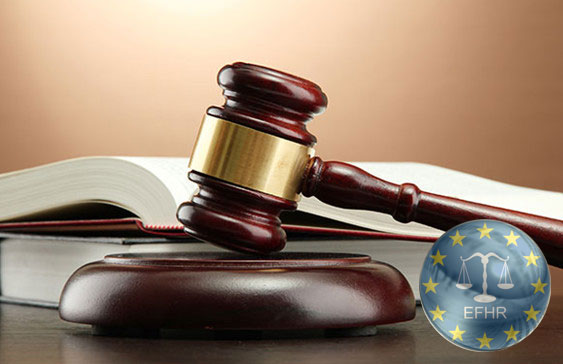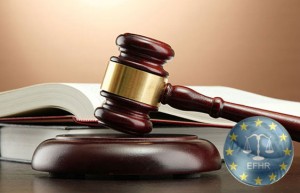- 2014/04/14
The aim of EFHR court cases – detecting gaps in the law

 The European Foundation of Human Rights (EFHR) is a non-governmental organization working for the sake of defending human rights and national minorities in Lithuania. One of the aims of EFHR is to detect gaps in the legal system. The foundation conducts court cases in order to detect such gaps in the Lithuanian law, which in turn generates positive changes both in the legal system as well raising the awareness of citizens. One such success was the allowance by the Commission of the Lithuanian Language to use the original spelling of names and surnames in official documents, introduced after an EFHR intervention.
The European Foundation of Human Rights (EFHR) is a non-governmental organization working for the sake of defending human rights and national minorities in Lithuania. One of the aims of EFHR is to detect gaps in the legal system. The foundation conducts court cases in order to detect such gaps in the Lithuanian law, which in turn generates positive changes both in the legal system as well raising the awareness of citizens. One such success was the allowance by the Commission of the Lithuanian Language to use the original spelling of names and surnames in official documents, introduced after an EFHR intervention.
One of the key points in defending the rights and freedoms of national minorities is striking a balance between defending the official language and providing opportunities to use the native language in public life. It is commonly heard that using a non-Lithuanian alphabet poses a threat to the national language. Such a statement does not have a legal basis. Yet, such a stance backs up the fact that, as of yet, national minorities cannot write their names and surnames in their original form based on the Latin alphabet, have bilingual street signs on private property or use their native language in public life.
Hugely hypocritical is the fact that, in spite of an explanation given by the Constitutional Court of the Republic of Lithuania in a decision from 27 February 2014 – that in individual cases, in passports belonging to citizens of the Republic of Lithuania, regarding the spelling of non-Lithuanian names and surnames, the use of letters not only from the Lithuanian alphabet, but from the Latin alphabet as well, is permitted – we do not have relevant legal regulations. More obvious gaps were detected by EFHR while conducting specific court cases.
In 2012 EFHR introduced an observation that names of firms, car registration plates, tourist inscriptions and excise stamps on excise products include letters which are not in the Lithuanian alphabet (http://en.efhr.eu/2012/07/19/surnames-no-the-names-of-companies-of-course/) despite the fact that letters ‘w’ ‘x’ and ‘q’ are not allowed for use in the spelling of names and surnames.
However, on 15 December 2012, EFHR received data about non-Lithuanian names and surnames spelled in passports belonging to citizens of the Republic of Lithuania and registered in Lithuania from The Office of Citizen Registry at the Ministry of the Interior of the Republic of Lithuania. According to the abovementioned data, there were more than 8, 000 names such as Alexander, Katarzyna, Ewa, Tadeusz, Matthew, Maxim, Joanna and Odetta, and surnames such as Lacroix, Leszczynska, Szczerba, Szulc, Brown etc. registered. (http://en.efhr.eu/change-your-name/). The given examples clearly point at partiality and blatant hypocrisy of the legal system, where it appears that the same rules do not apply to everyone.
In 2013, EFHR started two strategic court cases – the case of ‘WC’ and the case of Lech Kaczyński and Maria Kaczyńska. The latter was inspired by the position expressed by Egidijus Kūris that the present system of spelling names and surnames is not adequate, and he has put forward an idea to undermine a decree of ex-President Valdas Adamkus (http://www.delfi.lt/news/ringas/lit/ekuris-abeceles-nelaisveje.d?id=60748569). Following the case (http://en.efhr.eu/2013/07/23/absurd-argumentation-of-state-inspectorate-of-language-does-not-surprise-anymore/) the Commission allowed the usage of the original form of spelling of names and surnames in other languages in official documents (http://en.efhr.eu/2013/12/09/personal-names-can-now-retain-original-spelling-in-official-documents/).
The main obstacle to effective activity for EFHR while conducting court cases is EFHR not being recognized as a party of the proceedings. This means that, according to Lithuanian law, EFHR must represent a private person. Including changes introduced by the Commission on 9 April 2014, EFHR withdrew its complaint about a case regarding Lech and Maria Kaczyński. We are especially pleased that the Commission of the Lithuanian Language favoured the EFHR request and we count on further cooperation in the future.
EFHR
Translated by Kamil Żerek within the framework of a traineeship programme of the European Foundation of Human Rights, www.efhr.eu.



